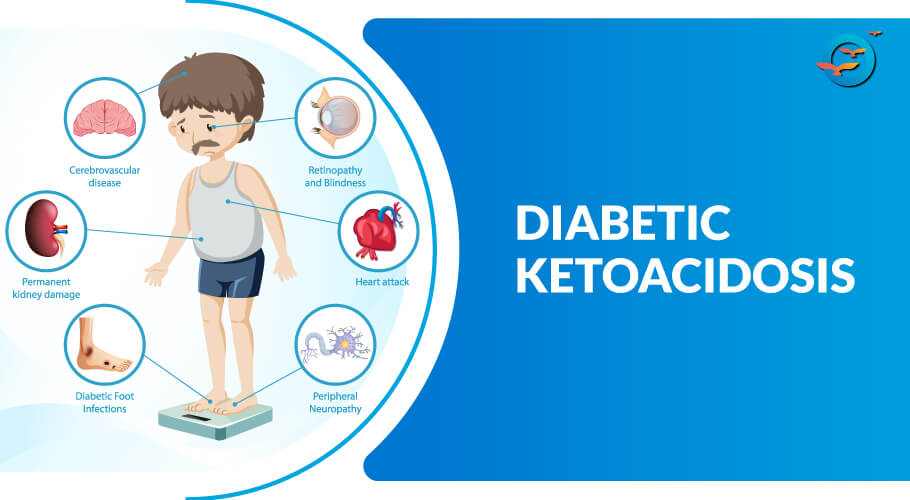
DKA symptoms and diabetic coma -
But it can also happen with other types of diabetes, including type 2 diabetes and gestational diabetes diabetes during pregnancy. DKA is a very serious condition.
If you have diabetes and think you may have DKA, contact your doctor or go to a hospital right away. The first symptoms to appear are usually:. If your sugar is very high or symptoms are severe especially confusion , you should go to the nearest emergency room.
The main cause of DKA is not producing enough insulin. Your cells need sugar for energy. To get energy, your body starts to burn fat. This process causes ketones to build up. Ketones can poison the body.
DKA can be caused by missing an insulin dose, eating poorly, or feeling stressed. An infection or other illness such as pneumonia or a urinary tract infection can also lead to DKA.
If you have signs of infection fever, cough, or sore throat , contact your doctor. For some people, DKA may be the first sign they have diabetes. If you think you may have diabetic ketoacidosis, contact your doctor right away.
They will want to run some blood tests before giving you an official diagnosis. These tests include checking your blood sugar and ketone level. Your doctor also may order a urinalysis requiring a urine sample and chest X-ray.
If you have diabetes, there are some things you can do to watch for diabetic ketoacidosis. Ask your doctor what your critical blood sugar level is. Patients should watch their glucose level closely when those levels are more than mg per dL.
If your blood sugar reaches a critical level, check it every 1 to 2 hours. Ask your doctor if you should test your blood sugar level during the night. You should talk to your doctor to develop a plan if your blood sugar level gets too high. Make sure that you know how to reach your doctor in an emergency.
DKA causes excessive urination. This means you will urinate more than usual. You can become dehydrated and your body can lose electrolytes minerals in your blood that help your body function. If you are diagnosed with DKA, your doctor will most likely treat you with fluids usually through an IV.
These fluids will contain electrolytes and insulin. Electrolytes will help your body function normally. Insulin will help lower your blood sugar level. Overall, fluids can help rehydrate you and dilute some of the sugar in your blood.
Keeping the balance between blood sugar and insulin is the key to controlling diabetic ketoacidosis. In most cases, this means sticking to your insulin schedule.
You should also try to recognize when you feel stressed or sick. Small adjustments to your eating or drinking can make a big difference. You should keep taking your insulin, even if you are too sick to eat.
If you use an insulin pump, keep a variety of supplies on hand. Make sure that you have short-acting insulin, long-acting insulin, and needles in case your pump is not working right. You also should have an emergency phone number to call for help with your pump. If your blood sugar level is more than mg per dL, avoid foods that are high in carbohydrates.
National Institutes of Health, MedlinePlus: Diabetic Ketoacidosis. This article was contributed by: familydoctor. org editorial staff. This information provides a general overview and may not apply to everyone.
Talk to your family doctor to find out if this information applies to you and to get more information on this subject. Sugar is a simple carbohydrate that provides calories for your body to use as energy.
There are two main…. Exercise can help people who have diabetes. DSMES services are a vital tool to help you manage and live well with diabetes while protecting your health. Skip directly to site content Skip directly to search. Español Other Languages. Diabetic Ketoacidosis. Español Spanish Print.
Minus Related Pages. High ketones? Call your doctor ASAP. Your breath smells fruity. You have multiple signs and symptoms of DKA.
Your treatment will likely include: Replacing fluids you lost through frequent urination and to help dilute excess sugar in your blood. Replacing electrolytes minerals in your body that help your nerves, muscles, heart, and brain work the way they should.
Too little insulin can lower your electrolyte levels. Receiving insulin. Insulin reverses the conditions that cause DKA. Taking medicines for any underlying illness that caused DKA, such as antibiotics for an infection.
Keep your blood sugar levels in your target range as much as possible. Take medicines as prescribed, even if you feel fine. Learn More. Learn About DSMES Living With Diabetes 4 Ways To Take Insulin Low Blood Sugar Hypoglycemia.
Last Reviewed: December 30, Source: Centers for Disease Control and Prevention. Facebook Twitter LinkedIn Syndicate.
Diabetic ketoacidosis is when a person coms diabetes has too Minerals for energy acid DKA symptoms and diabetic coma their blood. This happens when the body uses sympyoms for xiabetic instead Heart attack prevention sugar, and creates chemicals called ketones. DKA is an emergency that needs to be treated right away. Fortunately, it usually can be prevented. Symptoms that can happen in diabetic ketoacidosis when the blood sugar gets too high hyperglycemia include:. If sugar levels stay high, more serious symptoms can happen that need treatment in the ER.
So wird nicht gehen.
irgendwelcher seltsamer Verkehr wird erhalten.
Nimm sich nicht zu Herzen!